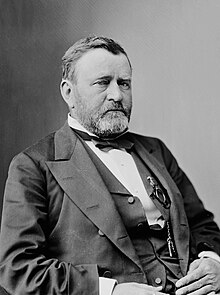General Ulysses S. Grant
| Ulysses S. Grant | |
|---|---|
 |
|
| 18th President of the United States | |
|
In office March 4, 1869 – March 4, 1877 |
|
| Vice President |
|
| Preceded by | Andrew Johnson |
| Succeeded by | Rutherford B. Hayes |
| 6th Commanding General of the United States Army | |
|
In office March 9, 1864 – March 4, 1869 |
|
| President |
Abraham Lincoln Andrew Johnson |
| Preceded by | Henry W. Halleck |
| Succeeded by | William Tecumseh Sherman |
| Acting United States Secretary of War | |
|
In office August 12, 1867 – January 14, 1868 |
|
| President | Andrew Johnson |
| Personal details | |
| Born |
Hiram Ulysses Grant April 27, 1822 Point Pleasant, Ohio, U.S. |
| Died | July 23, 1885 (aged 63) Wilton, New York, U.S. |
| Resting place |
General Grant National Memorial Manhattan, New York |
| Political party | Republican |
| Spouse(s) | Julia Grant (m. 1848) |
| Children | Frederick, Ulysses Jr., Nellie, and Jesse |
| Parents |
Jesse Root Grant Hannah Simpson |
| Alma mater | United States Military Academy |
| Occupation | Soldier, politician |
| Signature | |
| Military service | |
| Allegiance |
|
| Service/branch | |
| Years of service | 1839–1854 1861–1869 |
| Rank |
|
| Commands |
|
| Battles/wars |
|
| The Grant Cabinet | ||
|---|---|---|
| Office | Name | Term |
| President | Ulysses S. Grant | 1869–1877 |
| Vice President | Schuyler Colfax | 1869–1873 |
| Henry Wilson | 1873–1875 | |
| None | 1875–1877 | |
| Secretary of State | Elihu B. Washburne | 1869 |
| Hamilton Fish | 1869–1877 | |
| Secretary of Treasury | George S. Boutwell | 1869–1873 |
| William A. Richardson | 1873–1874 | |
| Benjamin H. Bristow | 1874–1876 | |
| Lot M. Morrill | 1876–1877 | |
| Secretary of War | John M. Schofield | 1869 |
| John A. Rawlins | 1869 | |
| William W. Belknap | 1869–1876 | |
| Alphonso Taft | 1876 | |
| J. Donald Cameron | 1876–1877 | |
| Attorney General | Ebenezer R. Hoar | 1869–1870 |
| Amos T. Akerman | 1870–1871 | |
| George H. Williams | 1871–1875 | |
| Edwards Pierrepont | 1875–1876 | |
| Alphonso Taft | 1876–1877 | |
| Postmaster General | John A. J. Creswell | 1869–1874 |
| James W. Marshall | 1874 | |
| Marshall Jewell | 1874–1876 | |
| James N. Tyner | 1876–1877 | |
| Secretary of the Navy | Adolph E. Borie | 1869 |
| George M. Robeson | 1869–1877 | |
| Secretary of the Interior | Jacob D. Cox | 1869–1870 |
| Columbus Delano | 1870–1875 | |
| Zachariah Chandler | 1875–1877 | |
Ulysses Simpson Grant (born Hiram Ulysses Grant; April 27, 1822 – July 23, 1885) was an American soldier and statesman who served as Commanding General of the Army and the 18th President of the United States, the highest positions in the military and the government of the United States. A prominent United States Army general during the American Civil War, Grant led the Union Army to victory over the Confederacy with the supervision of Abraham Lincoln. As President of the United States (1869–77) Grant led the Republicans in their efforts to remove the vestiges of Confederate nationalism and slavery during Reconstruction.
Grant was born and raised in Ohio by Methodist parents whose lineage in the new world went back several generations. As a youth he often worked in his father's tannery and showed an early talent for riding, taming and managing horses. After graduating from West Point in 1843 Grant served with distinction in the Mexican–American War. Upon his return he married Julia Dent, and together they had four children. Grant retired from the army in 1854 and struggled financially in civilian life. When the Civil War began in 1861 he rejoined the army and quickly rose through the ranks. As a general he took control of Kentucky, most of Tennessee, won major battles at Shiloh and seized Vicksburg, gaining control of the Mississippi River and dividing the Confederacy. These victories, combined with those in the Chattanooga Campaign, persuaded Abraham Lincoln that Grant was the general best suited to lead the combined Union armies. Grant was promoted to Lieutenant General, a rank previously reserved for George Washington, in March 1864. He confronted Robert E. Lee, trapping his army in their defense of Richmond, while coordinating a series of campaigns in other theaters. In April 1865 Lee surrendered to Grant at Appomattox, effectively ending the war. Historians have hailed Grant's military genius, and his strategies are featured in military history textbooks.
...
Wikipedia
